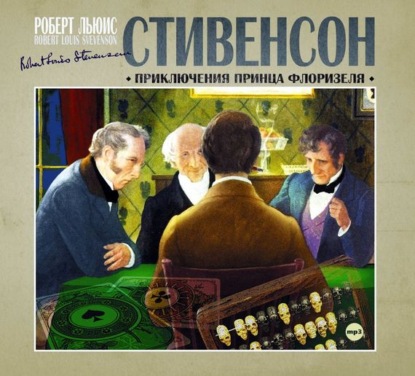 Полная версия
Полная версияПолная версия:
Роберт Льюис Стивенсон Vailima Letters
- + Увеличить шрифт
- - Уменьшить шрифт

Robert Louis Stevenson
Vailima Letters Being Correspondence Addressed by Robert Louis Stevenson to Sidney Colvin, November 1890-October 1894
EDITORIAL NOTE
So much of preface seems necessary to this volume as may justify its publication and explain its origin. The writer was for many years my closest friend. It was in the summer of 1873 that a lady, whose gracious influence has helped to shape and encourage more than one distinguished career, first awakened my interest in him and drew us together. He was at that time a lad of twenty-two, with his powers not yet set nor his way of life determined. But to know him was to recognise at once that here was a young genius of whom great things might be expected. A slender, boyish presence, with a graceful, somewhat fantastic bearing, and a singular power and attraction in the eyes and smile, were the signs that first impressed you; and the impression was quickly confirmed and deepened by the charm of his talk, which was irresistibly sympathetic and inspiring, and not less full of matter than of mirth. I have known no man in whom the poet’s heart and imagination were combined with such a brilliant strain of humour and such an unsleeping alertness and adroitness of the critical intelligence. But it was only in conversation that he could as yet do himself justice. His earliest efforts in literature were of a very uneven and tentative quality. The reason partly was that in mode of expression and choice of language, no less than in the formation of opinion and the conduct of life, he was impatient, even to excess, of the conventional, the accepted, and the trite. His perceptions and emotions were acute and vivid in the extreme; his judgments, whether founded on experience, reading, discussion, or caprice (and a surprising amount of all these things had been crowded into his youthful existence) were not less fresh and personal; while to his ardent fancy the world was a theatre glowing with the lights and bustling with the incidents of romance. To find for all he had to say words of vital aptness and animation – to communicate as much as possible of what he has somewhere called ‘the incommunicable thrill of things’ – was from the first his endeavour in literature, nay more, it was the main passion of his life. The instrument that should serve his purpose could not be forged in haste, still less could it be adopted at second hand or ready-made; and he has himself narrated how long and toilsome was the apprenticeship he served.
In those days, then, of Stevenson’s youth it was my good fortune to be of use to him, partly by helping to soften parental opposition to his inborn vocation for letters, partly by recommending him to editors (Mr. Hamerton, Sir George Grove, and Mr. Leslie Stephen in succession), and a little even by such technical hints as a classical training and five years’ seniority enabled me to give. It belonged to the richness of his nature to repay in all things much for little, ἑκατομβοἶ ἐννεαβοιών, and from these early relations sprang both the affection, to me inestimable, of which the following correspondence bears evidence, and the habit, which it pleased him to maintain after he had become one of the acknowledged masters of English letters, of confiding in and consulting me about his work in progress. It was my business to find fault; to ‘damn’ what I did not like; a duty which, as will be inferred from the following pages, I was accustomed to discharge somewhat unsparingly. But he was too manly a spirit to desire or to relish flattery, and too true an artist to be content with doing less than his best: he knew, moreover, in what rank of English writers I put him, and for what audience, not of to-day, I would have him labour. Tibi Palinure– so, in the last weeks of his life, he proposed to inscribe to me a set of his collected works. Not Palinurus so much as Polonius may perhaps – or so I sometimes suspect – have been really the character; but his own amiable view of the matter has to be mentioned in order to account for part of the tenor of the following correspondence.
As a letter-writer, Mr. Stevenson was punctilious in business matters (herein putting some violence on his nature), indefatigable where there was a service to be requited or a kindness done, and to strangers and slight acquaintances ever courteous and attentive. I am not sure, indeed, but that in this capacity it was the outer rather than the inner circle of his correspondents who, speaking generally, had the best of him. To his intimate friends he wrote charmingly indeed by fits, but often, at least in early days, in a manner not a little trying and tantalising. With these, his correspondence was apt to be a thing wholly of moods. ‘Sordid facts,’ as he called them, were almost never mentioned: date and place one could never infer except from the postmark. He would exclaim over some predicament to the nature of which he gave no clue whatever, or appeal for sympathy in circumstances impossible to conjecture; or, starting in a key of vague poetry and sentiment, would wind up (in a manner characteristic also of his talk) with a rhapsody of hyperbolical slang. Or he would dilate on some new phase of his many maladies with burlesque humour – with complaint never – but what had been the nature of the attack you were left to wonder and guess in vain. During the period of his Odyssey in the South Seas, from August 1888 until the spring of 1890, the remoteness and inaccessibility of the scenes he visited inevitably interrupted all correspondence for months together; and when at long intervals a packet reached us, the facts and circumstances of his wanderings were to be gathered from the admirable letters of Mrs. Stevenson (who has this feminine accomplishment in perfection) rather than from his own. But when later in the last-mentioned year, 1890, he and his family were settled on their newly bought property on the mountain behind Apia, to which he gave the name of Vailima (five rivers), he for the first time, to my infinite gratification, took to writing me long and regular monthly budgets as full and particular as heart could wish; and this practice he maintained until within a few weeks of his death.
It is these journal-letters from Samoa, covering with a few intervals the period from November 1890 to October 1894, that are printed by themselves in the present volume. They occupy a place, as has been indicated, quite apart in his correspondence, and in any general selection from his letters would fill a quite disproportionate space. Begun without a thought of publicity, and simply to maintain our intimacy undiminished, so far as might be, by separation, they assumed in the course of two or three years a bulk so considerable, and contained so much of the matter of his daily life and thoughts, that it by-and-by occurred to him, as may be read on page 200, that ‘some kind of a book’ might be extracted out of them after his death. It is this passage which has given me my warrant for their publication, and at the same time has imposed on me no very easy editorial task. In a correspondence so unreserved, the duty of suppression and selection must needs be delicate. Belonging to the race of Scott and Dumas, of the romantic narrators and creators, Stevenson belonged no less to that of Montaigne and the literary egotists. The word seems out of place, since of egotism in the sense of vanity or selfishness he was of all men the most devoid; but he was nevertheless a watchful and ever interested observer of the motions of his own mind. He saw himself, as he saw everything else, (to borrow the words of Mr. Andrew Lang) with the lucidity of genius, and loved to put himself on terms of confidence with his readers; but of confidence kept always within fit limits, and permitting no undue intrusion into his private affairs and feelings. To maintain the same limits in the editing of an intimate correspondence after his death would have been impossible. I have tried to do my best under the circumstances; to suffer no feelings to be hurt that could be spared, and only to lift the veil of family life so far as under the conditions was unavoidable. Neither would it have been possible from such a correspondence to expunge the record of those trivialities which make up the chief part of life, even in surroundings so romantic and unusual as Stevenson in these years had chosen for himself. It belonged to the personal charm of the man that nothing ever seemed commonplace or insignificant in his company; but in correspondence this charm must needs to some extent evaporate.
Such as they remain, then, these letters will be found a varied record, perfectly frank and familiar, of the writer’s every-day moods, thoughts, and doings during his Samoan exile. They tell, with the zest and often in the language of a man who remained to the last a boy in spirit, of the pleasures and troubles of a planter founding his home in the virgin soil of a tropical island; the pleasures of an invalid beginning after many years to resume habits of outdoor life and exercise; the toils and satisfactions, failures and successes, of a creative artist whose invention was as fertile as his standards were high and his industry unflinching. These divers characters have probably never been so united in any man before. Something also they tell of the inward movements and affections of one of the bravest and tenderest of human hearts. One part of his life, it should be said, which his other letters will fully reveal, finds little expression in these, namely the relations of cordial and ungrudging kindness in which he stood towards the younger generation of writers at home, including many personally unknown to him. Neither do ordinary impressions of travel – impressions of the beauties of the tropics and the captivating strangeness of the island people and their ways – fill much space in them. These things were no longer new to the writer when the correspondence began; they had been part of the element of his life since the day, near two years before, when his yacht first anchored in the Bay of Nukahiva, and his soul, to quote his own words, ‘went down with these moorings whence no windlass may extract nor any diver fish it up; and I, and some part of my ship’s company, were from that hour the bondslaves of the isles of Vivien.’ In their stead we find, what to some readers may be hardly so welcome, the observations of a close student of native life, history, and manners, and some of the perplexities and pre-occupations of an island politician.
The political allusions are seldom in the form of direct statement or narrative. To understand them, the reader must bear in mind a few main facts, which I shall state as briefly and plainly as possible. At the date when Stevenson settled in Samoa, the government of the island had lately been settled between the three powers interested, namely Germany, England, and the United States, at the convention of Berlin. Under this convention, Malietoa Laupepa, who had previously been deposed and deported by the Germans in favour of a nominee of their own, was reinstated as king, to the exclusion of his kinsman, the powerful and popular Mataafa, whose titles might be held equally good and whose abilities were certainly greater, but who was specially obnoxious to the Germans owing to his resistance to them during the troubles of the previous years. For a time the two kinsmen, Laupepa and Mataafa, lived on amicable terms, but presently differences arose between them. Mataafa had expected to occupy a position of influence in the government: finding himself ignored, he withdrew to a camp a few miles outside the town of Apia, where he lived in semi-royal state as a kind of passive rebel or rival to the recognised king. In the meantime, in the course of the year 1891, the two white officials appointed under the Berlin Convention, namely the Chief Justice, a Swedish gentleman named Cedarkrantz, and the President of the Council, Baron Senfft von Pilsach, had come out to the islands and entered on their duties. In Stevenson’s judgment these gentlemen proved quite unequal to their task, an opinion which before long came to be shared and acted on by the foreign offices of the three powers under whom they were appointed. Stevenson was no abstracted student or dreamer; the human interests and the human duties lying immediately about him were ever the first in his eyes: and petty and remote as these island concerns may appear to us, they were for him near and urgent. A man of his eager nature and persuasive powers must naturally acquire influence in any community in which he may be thrown, and among the natives in especial, by kindness, justice, and a sympathetic understanding of their ways and character, he soon came to enjoy a singular degree of authority. His unauthorised intervention in public matters may have been of a nature disconcerting to the official mind, but his purposes were at all times those of a peacemaker. The steady aim of his efforts was to bring about the withdrawal of the two discredited white officials (against whom, it will be seen, he had no personal animus whatever) and to procure a reconciliation between Laupepa and Mataafa, so that the latter might exercise the share in the government due to his character, titles, and following. The first part of this policy commended itself after a time to the three powers and their agents, and was carried out; the second not; and his friend Mataafa was by-and-by attacked by the forces of Laupepa, beaten, and sent into exile.
In reading the following pages it must be borne in mind that Mulinuu and Malie, the places respectively of Laupepa’s and Mataafa’s residence, are also used to signify their respective parties and followings. The reader will have no difficulty in identifying the various personages composing the family group whose names occur constantly in the correspondence, namely the writer’s mother, his wife (‘Fanny’), his stepson, Mr. Lloyd Osbourne (‘Lloyd’), his step-daughter and amanuensis, Mrs. Strong (‘Belle’), and her young son (‘Austin’). Explanation of any other matters seeming to require it is added in the footnotes.
S. C.August 1895.
CHAPTER I
In the Mountain, Apia, Samoa, Monday, November 2nd, 1890My dear Colvin, – This is a hard and interesting and beautiful life that we lead now. Our place is in a deep cleft of Vaea Mountain, some six hundred feet above the sea, embowered in forest, which is our strangling enemy, and which we combat with axes and dollars. I went crazy over outdoor work, and had at last to confine myself to the house, or literature must have gone by the board. Nothing is so interesting as weeding, clearing, and path-making; the oversight of labourers becomes a disease; it is quite an effort not to drop into the farmer; and it does make you feel so well. To come down covered with mud and drenched with sweat and rain after some hours in the bush, change, rub down, and take a chair in the verandah, is to taste a quiet conscience. And the strange thing that I mark is this: If I go out and make sixpence, bossing my labourers and plying the cutlass or the spade, idiot conscience applauds me; if I sit in the house and make twenty pounds, idiot conscience wails over my neglect and the day wasted. For near a fortnight I did not go beyond the verandah; then I found my rush of work run out, and went down for the night to Apia; put in Sunday afternoon with our consul, ‘a nice young man,’ dined with my friend H. J. Moors in the evening, went to church – no less – at the white and half-white church – I had never been before, and was much interested; the woman I sat next looked a full-blood native, and it was in the prettiest and readiest English that she sang the hymns; back to Moors’, where we yarned of the islands, being both wide wanderers, till bed-time; bed, sleep, breakfast, horse saddled; round to the mission, to get Mr. Clarke to be my interpreter; over with him to the King’s, whom I have not called on since my return; received by that mild old gentleman; have some interesting talk with him about Samoan superstitions and my land – the scene of a great battle in his (Malietoa Laupepa’s) youth – the place which we have cleared the platform of his fort – the gulley of the stream full of dead bodies – the fight rolled off up Vaea mountain-side; back with Clarke to the Mission; had a bit of lunch and consulted over a queer point of missionary policy just arisen, about our new Town Hall and the balls there – too long to go into, but a quaint example of the intricate questions which spring up daily in the missionary path.
Then off up the hill; Jack very fresh, the sun (close on noon) staring hot, the breeze very strong and pleasant; the ineffable green country all round – gorgeous little birds (I think they are humming birds, but they say not) skirmishing in the wayside flowers. About a quarter way up I met a native coming down with the trunk of a cocoa palm across his shoulder; his brown breast glittering with sweat and oil: ‘Talofa’ – ‘Talofa, alii – You see that white man? He speak for you.’ ‘White man he gone up here?’ – ‘Ioe (Yes)’ – ‘Tofa, alii’ – ‘Tofa, soifua!’ I put on Jack up the steep path, till he is all as white as shaving stick – Brown’s euxesis, wish I had some – past Tanugamanono, a bush village – see into the houses as I pass – they are open sheds scattered on a green – see the brown folk sitting there, suckling kids, sleeping on their stiff wooden pillows – then on through the wood path – and here I find the mysterious white man (poor devil!) with his twenty years’ certificate of good behaviour as a book-keeper, frozen out by the strikes in the colonies, come up here on a chance, no work to be found, big hotel bill, no ship to leave in – and come up to beg twenty dollars because he heard I was a Scotchman, offering to leave his portmanteau in pledge. Settle this, and on again; and here my house comes in view, and a war whoop fetches my wife and Henry (or Simelé), our Samoan boy, on the front balcony; and I am home again, and only sorry that I shall have to go down again to Apia this day week. I could, and would, dwell here unmoved, but there are things to be attended to.
Never say I don’t give you details and news. That is a picture of a letter.
I have been hard at work since I came; three chapters of The Wrecker, and since that, eight of the South Sea book, and, along and about and in between, a hatful of verses. Some day I’ll send the verse to you, and you’ll say if any of it is any good. I have got in a better vein with the South Sea book, as I think you will see; I think these chapters will do for the volume without much change. Those that I did in the Janet Nicoll, under the most ungodly circumstances, I fear will want a lot of suppling and lightening, but I hope to have your remarks in a month or two upon that point. It seems a long while since I have heard from you. I do hope you are well. I am wonderful, but tired from so much work; ’tis really immense what I have done; in the South Sea book I have fifty pages copied fair, some of which has been four times, and all twice written, certainly fifty pages of solid scriving inside a fortnight, but I was at it by seven a.m. till lunch, and from two till four or five every day; between whiles, verse and blowing on the flageolet; never outside. If you could see this place! but I don’t want any one to see it till my clearing is done, and my house built. It will be a home for angels.
So far I wrote after my bit of dinner, some cold meat and bananas, on arrival. Then out to see where Henry and some of the men were clearing the garden; for it was plain there was to be no work to-day indoors, and I must set in consequence to farmering. I stuck a good while on the way up, for the path there is largely my own handiwork, and there were a lot of sprouts and saplings and stones to be removed. Then I reached our clearing just where the streams join in one; it had a fine autumn smell of burning, the smoke blew in the woods, and the boys were pretty merry and busy. Now I had a private design: —
The Vaita’e I had explored pretty far up; not yet the other stream, the Vaituliga (g=nasal n, as ng in sing); and up that, with my wood knife, I set off alone. It is here quite dry; it went through endless woods; about as broad as a Devonshire lane, here and there crossed by fallen trees; huge trees overhead in the sun, dripping lianas and tufted with orchids, tree ferns, ferns depending with air roots from the steep banks, great arums – I had not skill enough to say if any of them were the edible kind, one of our staples here! – hundreds of bananas – another staple – and alas! I had skill enough to know all of these for the bad kind that bears no fruit. My Henry moralised over this the other day; how hard it was that the bad banana flourished wild, and the good must be weeded and tended; and I had not the heart to tell him how fortunate they were here, and how hungry were other lands by comparison. The ascent of this lovely lane of my dry stream filled me with delight. I could not but be reminded of old Mayne Reid, as I have been more than once since I came to the tropics; and I thought, if Reid had been still living, I would have written to tell him that, for, me, it had come true; and I thought, forbye, that, if the great powers go on as they are going, and the Chief Justice delays, it would come truer still; and the war-conch will sound in the hills, and my home will be inclosed in camps, before the year is ended. And all at once – mark you, how Mayne Reid is on the spot – a strange thing happened. I saw a liana stretch across the bed of the brook about breast-high, swung up my knife to sever it, and – behold, it was a wire! On either hand it plunged into thick bush; to-morrow I shall see where it goes and get a guess perhaps of what it means. To-day I know no more than – there it is. A little higher the brook began to trickle, then to fill. At last, as I meant to do some work upon the homeward trail, it was time to turn. I did not return by the stream; knife in hand, as long as my endurance lasted, I was to cut a path in the congested bush.
At first it went ill with me; I got badly stung as high as the elbows by the stinging plant; I was nearly hung in a tough liana – a rotten trunk giving way under my feet; it was deplorable bad business. And an axe – if I dared swing one – would have been more to the purpose than my cutlass. Of a sudden things began to go strangely easier; I found stumps, bushing out again; my body began to wonder, then my mind; I raised my eyes and looked ahead; and, by George, I was no longer pioneering, I had struck an old track overgrown, and was restoring an old path. So I laboured till I was in such a state that Carolina Wilhelmina Skeggs could scarce have found a name for it. Thereon desisted; returned to the stream; made my way down that stony track to the garden, where the smoke was still hanging and the sun was still in the high tree-tops, and so home. Here, fondly supposing my long day was over, I rubbed down; exquisite agony; water spreads the poison of these weeds; I got it all over my hands, on my chest, in my eyes, and presently, while eating an orange, à la Raratonga, burned my lip and eye with orange juice. Now, all day, our three small pigs had been adrift, to the mortal peril of our corn, lettuce, onions, etc., and as I stood smarting on the back verandah, behold the three piglings issuing from the wood just opposite. Instantly I got together as many boys as I could – three, and got the pigs penned against the rampart of the sty, till the others joined; whereupon we formed a cordon, closed, captured the deserters, and dropped them, squeaking amain, into their strengthened barracks where, please God, they may now stay!
Perhaps you may suppose the day now over; you are not the head of a plantation, my juvenile friend. Politics succeeded: Henry got adrift in his English, Bene was too cowardly to tell me what he was after: result, I have lost seven good labourers, and had to sit down and write to you to keep my temper. Let me sketch my lads. – Henry – Henry has gone down to town or I could not be writing to you – this were the hour of his English lesson else, when he learns what he calls ‘long expessions’ or ‘your chief’s language’ for the matter of an hour and a half – Henry is a chiefling from Savaii; I once loathed, I now like and – pending fresh discoveries – have a kind of respect for Henry. He does good work for us; goes among the labourers, bossing and watching; helps Fanny; is civil, kindly, thoughtful; O si sic semper! But will he be ‘his sometime self throughout the year’? Anyway, he has deserved of us, and he must disappoint me sharply ere I give him up. – Bene – or Peni-Ben, in plain English – is supposed to be my ganger; the Lord love him! God made a truckling coward, there is his full history. He cannot tell me what he wants; he dares not tell me what is wrong; he dares not transmit my orders or translate my censures. And with all this, honest, sober, industrious, miserably smiling over the miserable issue of his own unmanliness. – Paul – a German – cook and steward – a glutton of work – a splendid fellow; drawbacks, three: (1) no cook; (2) an inveterate bungler; a man with twenty thumbs, continually falling in the dishes, throwing out the dinner, preserving the garbage; (3) a dr – , well, don’t let us say that – but we daren’t let him go to town, and he – poor, good soul – is afraid to be let go. – Lafaele (Raphael), a strong, dull, deprecatory man; splendid with an axe, if watched; the better for a rowing, when he calls me ‘Papa’ in the most wheedling tones; desperately afraid of ghosts, so that he dare not walk alone up in the banana patch – see map. The rest are changing labourers; and to-night, owing to the miserable cowardice of Peni, who did not venture to tell me what the men wanted – and which was no more than fair – all are gone – and my weeding in the article of being finished! Pity the sorrows of a planter.



